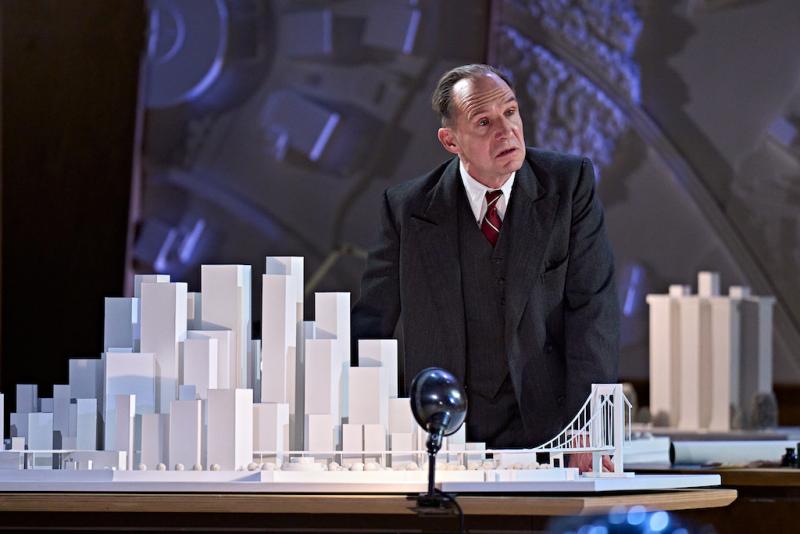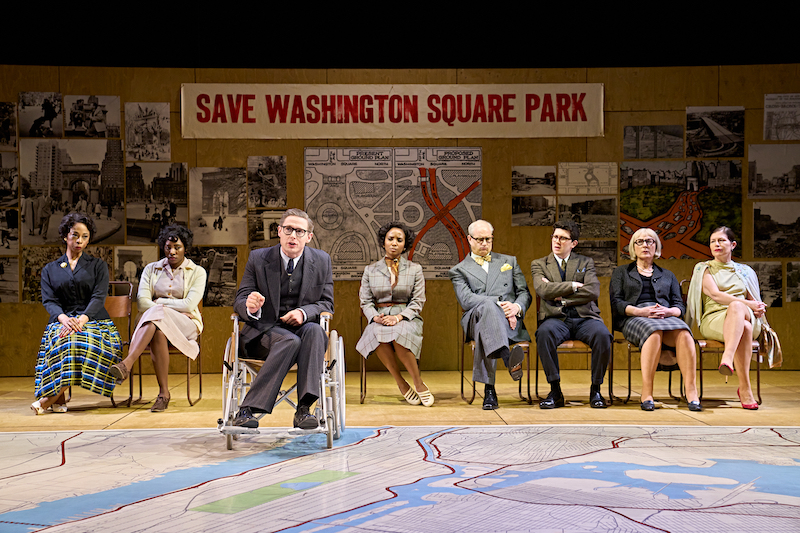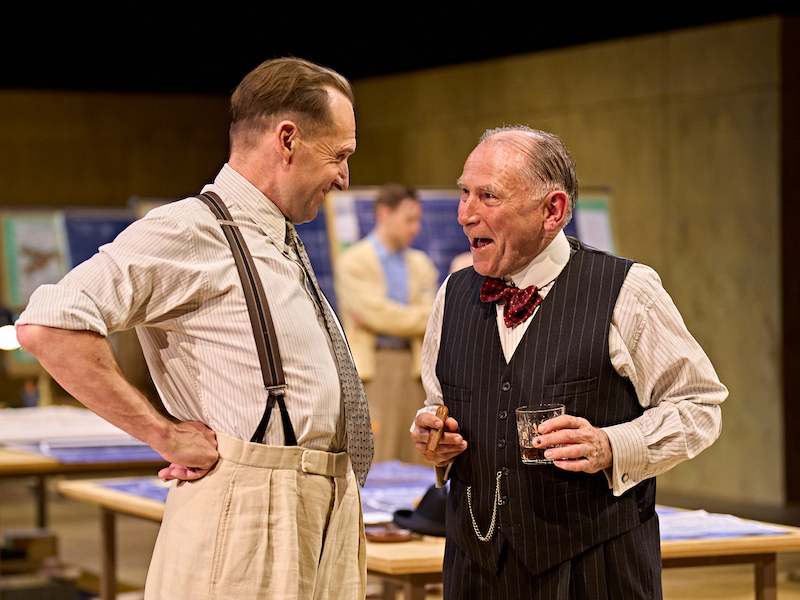Straight Line Crazy, Bridge Theatre review – in desperate need of a curve ball | reviews, news & interviews
Straight Line Crazy, Bridge Theatre review – in desperate need of a curve ball
Straight Line Crazy, Bridge Theatre review – in desperate need of a curve ball
Ralph Fiennes plays infamous New York planner Robert Moses in David Hare’s new play

A few years ago Ralph Fiennes starred as the narcissistic, belligerently ambitious, ultimately tragic architect Halvard Solness in Ibsen’s The Master Builder, in a fine adaptation by David Hare. You might argue that there isn’t much of a leap from the fictional architect to the real-life New York planner Robert Moses, though Moses didn’t die falling from one of his buildings.
Moses is one of the most influential and divisive figures in the history of New York, a man whose creations of parks and highways transformed the city and its environs – for great good, or ill, depending on who you’re talking to. Arguably the most controversial thing about him was the sheer power that he wielded, and the impunity with which he wielded it.
Such a complicated legacy offers rich pickings for a playwright who’s always been fascinated by the uses and abuses of power. Hare’s new play neatly tackles two phases of Moses’s career: in the Twenties, as he’s embarking on his successful plan to build highways that connect the city to Long Island, creating a whole new world of leisure for working people, much to the chagrin of the monied elite who want the island to themselves; and the Fifties, as his radical plan to put a highway through Washington Square falls foul of local activists.  This structure is fine, offering a rise and full study of rampant ambition, amid a discussion about the role and responsibilities of urban planning, notably whether democratic processes help or hinder ‘progress’. It also informs the role of class in Moses’s power plays: in Act One he’s a hero when taking on the Vanderbilts and Whitneys of Long Island, after the interval a villain, when we learn that the poor, black residents of the Bronx lost their homes to make way for his ‘heartbreak highway’ (the play’s title refers to the planner’s refusal to deviate from his ruler, whatever might get destroyed in the process). Ironically, the middle classes Moses may have felt most aligned to prove to be his Achilles heel.
This structure is fine, offering a rise and full study of rampant ambition, amid a discussion about the role and responsibilities of urban planning, notably whether democratic processes help or hinder ‘progress’. It also informs the role of class in Moses’s power plays: in Act One he’s a hero when taking on the Vanderbilts and Whitneys of Long Island, after the interval a villain, when we learn that the poor, black residents of the Bronx lost their homes to make way for his ‘heartbreak highway’ (the play’s title refers to the planner’s refusal to deviate from his ruler, whatever might get destroyed in the process). Ironically, the middle classes Moses may have felt most aligned to prove to be his Achilles heel.
However, despite its solid foundation, and a typically muscular performance by Fiennes, this doesn’t soar, or probe as potently as it might. Indeed, it quickly becomes preachy and wearing. Too many characters, whether real or invented, act merely as devices to further the dialectic without being sufficiently drawn to make us care for their views. His chief assistants Finnuala and Ariel (Siobhan Cullen and Samuel Barnett) literally stop working to speak to their boss in one contrived scenario after another; the activists who confront him, including real-life journalist and activist Jane Jacobs (Helen Schlesinger), are wooden and unsympathetic.  Only one character gives Moses a run for his money, and Fiennes someone to wrestle with: Danny Webb’s Governor Al Smith (pictured above, with Fiennes) is a blessed relief, a heavy-drinking, politically savvy, inherently decent man who empowers Moses for the good he may do, despite knowing that his methods are suspect. Fiennes and Webb roaring at each other in love and anger offer the highlight of the evening.
Only one character gives Moses a run for his money, and Fiennes someone to wrestle with: Danny Webb’s Governor Al Smith (pictured above, with Fiennes) is a blessed relief, a heavy-drinking, politically savvy, inherently decent man who empowers Moses for the good he may do, despite knowing that his methods are suspect. Fiennes and Webb roaring at each other in love and anger offer the highlight of the evening.
Elsewhere, Fiennes does his best – strutting, cajoling and lambasting, with the occasional shard of mischievous humour; but his character also needs more from the text, not least a tragic dimension. Like Solness, there’s a neglected wife and, in Finnuala, the hinted potential for a more rewarding love, each collateral damage of his myopic mission, but nothing of his personal life is developed on stage; and Moses’ belief that he is needed, but not loved by the city doesn’t resonate as it might have.
If this were not to be a full-blown tragedy, it could have gone another way, as a Capraesque comedy-drama of political skulduggery and folly. As it stands, a rather dry debate doesn’t really bring the walls down.
Bob Crowley’s design has a clean functionality, most impressive when the bare stage is filled, almost imperceptible, with the drawing boards and paraphernalia of a planning office. In contrast, Nicholas Hytner’s direction would have benefited from a little more energy and mess, flesh and blood.
The future of Arts Journalism
You can stop theartsdesk.com closing!
We urgently need financing to survive. Our fundraising drive has thus far raised £49,000 but we need to reach £100,000 or we will be forced to close. Please contribute here: https://gofund.me/c3f6033d
And if you can forward this information to anyone who might assist, we’d be grateful.

Subscribe to theartsdesk.com
Thank you for continuing to read our work on theartsdesk.com. For unlimited access to every article in its entirety, including our archive of more than 15,000 pieces, we're asking for £5 per month or £40 per year. We feel it's a very good deal, and hope you do too.
To take a subscription now simply click here.
And if you're looking for that extra gift for a friend or family member, why not treat them to a theartsdesk.com gift subscription?
more Theatre
 The Line of Beauty, Almeida Theatre review - the 80s revisited in theatrically ravishing form
Alan Hollinghurst novel is cunningly filleted, very finely acted
The Line of Beauty, Almeida Theatre review - the 80s revisited in theatrically ravishing form
Alan Hollinghurst novel is cunningly filleted, very finely acted
 Wendy & Peter Pan, Barbican Theatre review - mixed bag of panto and comic play, turned up to 11
The RSC adaptation is aimed at children, though all will thrill to its spectacle
Wendy & Peter Pan, Barbican Theatre review - mixed bag of panto and comic play, turned up to 11
The RSC adaptation is aimed at children, though all will thrill to its spectacle
 Hedda, Orange Tree Theatre review - a monument reimagined, perhaps even improved
Scandinavian masterpiece transplanted into a London reeling from the ravages of war
Hedda, Orange Tree Theatre review - a monument reimagined, perhaps even improved
Scandinavian masterpiece transplanted into a London reeling from the ravages of war
 The Assembled Parties, Hampstead review - a rarity, a well-made play delivered straight
Witty but poignant tribute to the strength of family ties as all around disintegrates
The Assembled Parties, Hampstead review - a rarity, a well-made play delivered straight
Witty but poignant tribute to the strength of family ties as all around disintegrates
 Mary Page Marlowe, Old Vic review - a starry portrait of a splintered life
Tracy Letts's Off Broadway play makes a shimmeringly powerful London debut
Mary Page Marlowe, Old Vic review - a starry portrait of a splintered life
Tracy Letts's Off Broadway play makes a shimmeringly powerful London debut
 Little Brother, Soho Theatre review - light, bright but emotionally true
This Verity Bargate Award-winning dramedy is entertaining as well as thought provoking
Little Brother, Soho Theatre review - light, bright but emotionally true
This Verity Bargate Award-winning dramedy is entertaining as well as thought provoking
 The Unbelievers, Royal Court Theatre - grimly compelling, powerfully performed
Nick Payne's new play is amongst his best
The Unbelievers, Royal Court Theatre - grimly compelling, powerfully performed
Nick Payne's new play is amongst his best
 The Maids, Donmar Warehouse review - vibrant cast lost in a spectacular-looking fever dream
Kip Williams revises Genet, with little gained in the update except eye-popping visuals
The Maids, Donmar Warehouse review - vibrant cast lost in a spectacular-looking fever dream
Kip Williams revises Genet, with little gained in the update except eye-popping visuals
 Ragdoll, Jermyn Street Theatre review - compelling and emotionally truthful
Katherine Moar returns with a Patty Hearst-inspired follow up to her debut hit 'Farm Hall'
Ragdoll, Jermyn Street Theatre review - compelling and emotionally truthful
Katherine Moar returns with a Patty Hearst-inspired follow up to her debut hit 'Farm Hall'
 Troilus and Cressida, Globe Theatre review - a 'problem play' with added problems
Raucous and carnivalesque, but also ugly and incomprehensible
Troilus and Cressida, Globe Theatre review - a 'problem play' with added problems
Raucous and carnivalesque, but also ugly and incomprehensible
 Clarkston, Trafalgar Theatre review - two lads on a road to nowhere
Netflix star, Joe Locke, is the selling point of a production that needs one
Clarkston, Trafalgar Theatre review - two lads on a road to nowhere
Netflix star, Joe Locke, is the selling point of a production that needs one
 Ghost Stories, Peacock Theatre review - spirited staging but short on scares
Impressive spectacle saves an ageing show in an unsuitable venue
Ghost Stories, Peacock Theatre review - spirited staging but short on scares
Impressive spectacle saves an ageing show in an unsuitable venue

Add comment